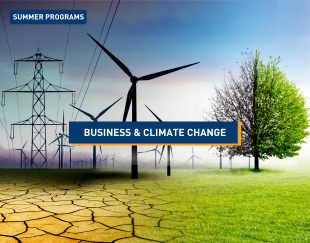Energy and Finance
Summer Program
Energy and infrastructure projects are very capital intensive and investing in infrastructure and real assets necessitates particular understanding of energy markets, real assets financing and industrial value chains.

WHEN?
Information Session
Discover our leading programs in Finance, Energy & Sustainability
The Academic Director of two of our most impactful Summer Programs joined the Recruitment Manager for a webinar on Thursday February 19th to present the programs Energy & Finance and Sustainable Finance & Investment and answer attendees' questions. You can request the REPLAY link by sending an email to admissionsummerschool@hec.fr.
About the program
This program is a compact edition of the popular Energy & Finance Certificate which is offered in our Master’s degree programs. It addresses the need for students and young professionals to develop a comprehensive, financial and strategic view of the new business models created within the energy sector largely impacted by climate issues, from the manufacturing sector to the financing industry.
- Bridge consulting and industry expertise: Gain a strong command of energy markets, climate risks, and financing structures - essential for consultants advising governments, corporations, and investors on strategic energy decisions.
- Master infrastructure finance: Learn how to structure and evaluate capital-intensive projects in energy and infrastructure, equipping you to guide countries and companies in mobilizing investment for long-term sustainability.
- Understand global energy transitions: Build a comprehensive view of how decentralization, digitization, and renewable technologies are reshaping economies, and how consultants can help clients adapt to these profound transformations.
- Develop strategic insight into policy and geopolitics: Explore international climate policies, carbon taxation, and geopolitical tensions that shape energy supply and demand, preparing you to advise on risk and resilience.
- Position yourself in high-growth sectors: Understand the economics of climate tech, energy tech, and decarbonization solutions, areas where consulting firms and investment funds are rapidly expanding their focus.
This intermediate program is accessible to motivated, ambitious participants with at least 2 years of undergraduate studies in a related field, such as Business or Economics, at the time of the program. Students with engineering or sustainability backgrounds are also welcome.
The program is aimed at participants who:
• are moving to the consulting business and will need a strong command of energy, climate, resources and carbon risks, from a public policy, corporate and financial perspective.
• are moving to the financing/banking industry as professionals who will be required to have an in-depth command of energy & infrastructure finance and market risks.
• are moving to the investment industry PE, Infrastructure or VC funds as private equity professionals who will need to master industry dynamics and economics of different business models and technologies.
• have no background in climate issues and energy business and are willing to acquire a quick command of the essential drivers of the global economy.
• have a background in business, engineering or sustainability issues and seek to acquire a complete view on the big picture of energy economics and energy project and infrastructure finance.
Major trends are driving growth in energy and infrastructure investments: digitalization, the AI boom, the energy transition, electrification, urbanization, and the development of social services. There is a growing interest from all investors globally in investing and financing large capital-intensive assets and infrastructure since these assets generate sustainable cash flows and contribute to long term value creation. Energy transition is transforming economies and industries as we know it and tens of billions are deployed in capital to decarbonize the economy.
The financial sector has a key role to play in supporting the transition and providing the right capital to invest in these key major trends.
This program will enable you to understand drivers behind the energy transition and profound transformations in global economies, as well as what financing techniques to use when financing large energy projects and infrastructure assets such as project finance, infrastructure finance and asset finance.
Upon successful completion of the summer program, participants will have acquired an understanding of the following:
- Global and regional resources/energy issues, across the various segments of the value chain, including key geopolitical tensions and dynamics.
- International and national energy & climate policies, including carbon taxation and carbon trading systems.
- The economics of new energy models, including decentralization and digitization of energy systems, renewable capacity development, wind and solar energy contracts and regulations.
- The principles of financing energy, including project finance and infrastructure finance.
- The private investment ecosystem including private equity, infrastructure and private debt actors and how energy transition is a big focus of these funds.
Participants will also learn financial modeling techniques and economics of LCOE (Levelized Cost of Energy) calculations.
The program includes interactive lectures, class exercises and tutoring sessions corresponding to Case Studies which students address in groups and defend at the end of the program.
Pre-program Readings:
Participants will be requested to prepare for the Summer School with several mandatory readings. Further recommended readings will be provided and will help participants make the most of the Summer School.
Energy Crisis Simulation:
Students will participate in a full day serious game and will be asked to manage an energy crisis using a real-life energy crisis simulator. This exercise will give a professional perspective on complexity and financial impacts, being in the shoes of C level decision makers in the time of crisis.
Case Study:
For the duration of the course, participants are required to contribute individual and group work to the completion (and defense) of a Case Study.
These real life business cases or topics consist of business model structuring, fund raising, risk assessment exercise, project development, corporate strategy decision, always in response to a particular crisis, market constraint or regulatory change.
Case Studies are a unique opportunity for students to carry out an in-depth investigation on a complex strategy issue involving international markets, financial governance, public policy and operational constraints.
Grading will include the following elements:
- Class participation and individual contribution to class learning: 20%
- In-class group exercises: 20%
- Case study pitch and defense: 60%
Participants who successfully complete the program will earn 5 ECTS credits. Full attendance is required to obtain the Program Certificate.
All students who are seeking credit are encouraged to consult their home academic institution to validate credit transfer.
Participants of this program may wish to deepen their knowledge and sharpen their skills by subsequently attending the Sustainable Finance and Investment program that explores green and sustainable finance techniques and frameworks. It has a major focus on financing the energy transition, and financing and investment techniques in new business models, such as the circular economy, adaptation, blue economy, nature-based solutions, impact investing etc.








